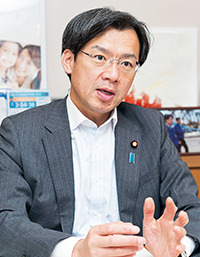
Last year, we marked the 60th anniversary of the start of Japanese official development assistance (ODA). During this time, the role of Japanese ODA has gradually adapted to changes in the international community, but it has consistently contributed to the reduction of poverty in developing countries and the building of peace. In February of this year, the "Development Cooperation Charter" was amended to explicitly incorporate the perspective of contributing to Japan's national interest as a part of ODA. We spoke with Kenya Akiba, Director, Foreign Affairs Division, about the achievements and future of development cooperation.
Q: What has Japanese ODA achieved?
Kenya Akiba, Director of the Foreign Affairs Division: Unlike European and North American countries, Japan's ODA is designed to "give momentum to self-help efforts" and "support sustainable economic growth" with a goal of contributing to the independence of developing countries, and it is notable for its emphasis on assistance oriented towards what is known as "human security," a perspective that focuses on individual citizens.
To this point, Japan has provided a total of 42 trillion yen in assistance to 190 countries and regions, as well as sending 136,000 experts and 47,000 volunteers, and training 540,000 people.
These initiatives have been instrumental in securing the safety and prosperity of Japan and the Japanese people, and creating a platform for economic and social activities. Our most important achievement, however, has been to turn Japan into a "country that is trusted by the rest of the world."
A public opinion survey conducted last year in seven ASEAN countries found that approximately 90% appreciated the international contributions that Japan had made, and it should still be fresh in everyone's memory how generous the outpouring of assistance was from developing countries and other countries and regions at the time of the Great East Japan Earthquake.
The history of Japanese ODA embodies the attitude and approach that Japan has taken as a pacifist country in the 70 years since the end of the war. It puts into practice the international cooperation and "proactive contributions to peace" articulated by Prime Minister Shinzo Abe.
Q: This February, the first revision was made to the ODA charter in about 12 years, and it was renamed the document the "Development Cooperation Charter." What do you think about the new charter?
Akiba: For the first time, the revisions explicitly include the wording "to secure its national interests" in the description of the strategy. This takes its cue from the "National Security Strategy" (Cabinet decision, December 2013) and, I think, deserves high marks for emphasizing the perspective of national interest now, as emerging economies achieve greater and greater presence on the world stage.
The new charter also says, "In case the armed forces or members of the armed forces in recipient countries are involved in development cooperation for non-military purposes, such cases will be considered on a case-by-case basis in light of their substantive relevance," which is an explicit statement that disaster rescue activities, relief supplies, and other aid in non-military areas will be determined based on individual merits, without an a priori exclusion of the military organizations and people of developing countries from cooperation partners. Obviously, this is based on the principle of not allowing ODA to be used for military purposes, but reflects the international reality that the military plays an increasingly central role in dealing with non-military areas, such as reconstruction assistance and efforts to control infectious diseases.
Q: What is necessary to promote development cooperation under the new charter?
Akiba: In March of this year, the Foreign Affairs Division, Headquarters for Regional Diplomatic and Economic Partnership (Chairperson: Seishiro Eto, member of the House of Representatives), and Research Commission on International Cooperation (Chairperson: Masaharu Nakagawa, member of the House of Councillors) completed a document called "Recommendations for the Strategic Promotion of Development Cooperation" and submitted it to Prime Minister Abe.
There were seven main recommendations. Among the highlights were: (1) promoting more strategic development cooperation to contribute to Japan's national interest; (2) strategically implementing development cooperation that leverages Japan's strengths; and (3) providing sufficient and necessary budget and implementation structures. In the section on "promotion of strategic development cooperation," the recommendations note the need for public-private coordination, including assistance for small and medium-sized enterprises and collaboration with local governments, so that development cooperation serves as a catalyst for attracting private sector funding and insights.
The section on "strategically implementing Japanese-style development cooperation" notes the major roles played by the Japan Overseas Cooperation Volunteers and other volunteers in implementing Japan-style ODA, and recommends broadening the scope of participants, ensuring that their experiences also benefit Japanese society, and further enhancing and expanding programs.
When considering the significant contribution of ODA for Japan's national interest, the "necessary and sufficient implementation structure" is crucial, a point that I, as director of the Foreign Affairs Division, would like to particularly underscore. Japan has promised to achieve an international target of allocating 0.7% of gross national income (GNI) to ODA, but we are currently only at 0.19% (2014), which is a long way away.
The ODA budget has been cut down for the past 16 years in a row, and is currently less than half of what it was 20 years ago. The problem is that for Japan to survive and thrive in the international community, it needs to build friendly relationships with other countries and seek their understanding and support for its ideas. That is why we must see ODA as an "investment into the future," use it wisely, and ensure that there is, ultimately, a large payoff for Japan as well.
Q: What do you plan to do going forward?
Akiba: In the UK and France, the basic laws governing ODA require reporting to the legislature. I think it is important for the legislative branch to constantly discuss and verify the implementation and outcomes of development cooperation. I look forward to deepening our discussions about the future of development assistance as we follow up on the recommendations.










